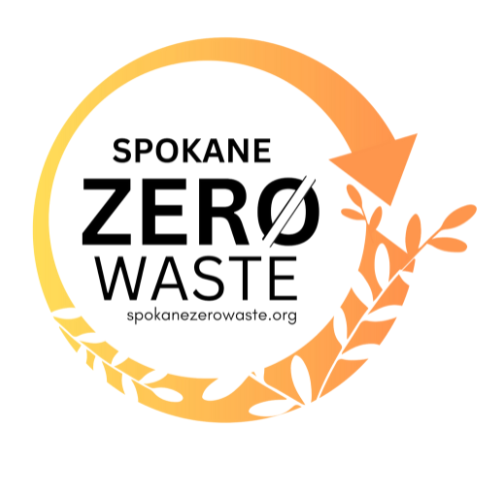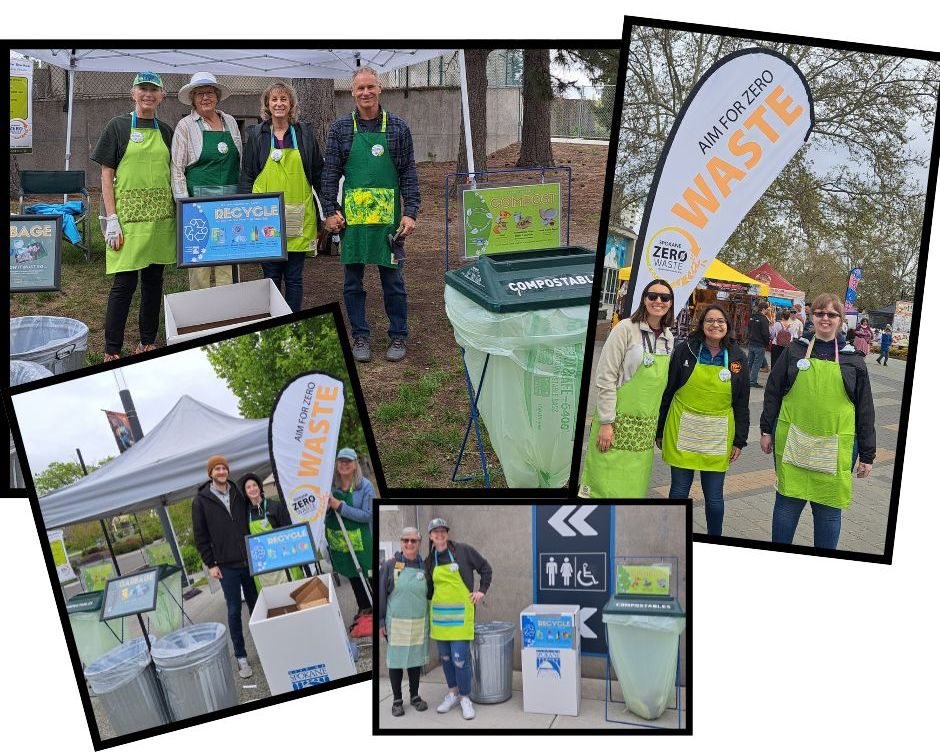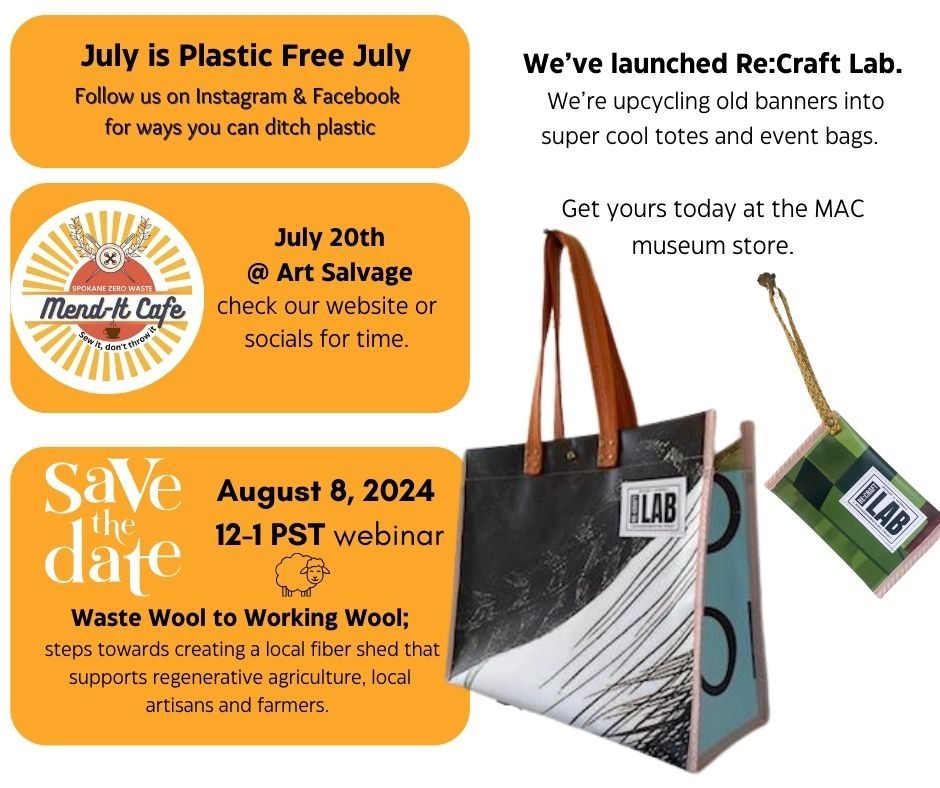The 5th “R”…Rot
You probably don’t think too much about rotting food. It’s kinda gross, and most people’s first inclination when they see it is to discard it….in the trash.
Organic material such as leaves, grass clippings, and food releases methane, a potent greenhouse gas produced when these items are in a low oxygen environment such as a landfill. In fact, landfills account for 17% of methane pollution in the US. In Spokane county, most of our garbage is sent to the Waste to Energy plant, which might make you think the food you throw in the trash will be turned into electricity. Unfortunately, food waste is too wet to burn efficiently and actually slows down the whole process of turning waste to energy.
As disappointing as this may be, reducing food waste and turning organic matter into compost is an easy, inexpensive, and effective climate solution everyone can be a part of.
Composting is a great example of the sort of change Spokane Zero Waste is working towards, building a circular system where food waste is turned into Earth food, literally. When compost is added to soil, it makes it healthier, it retains water better, and it is better able to sequester carbon.This healthy soil is then able to support the growth of more healthier food.
Tip: Acceptable items to put in Spokane’s green bins are yard and grass clippings, vegetable scraps, chicken bones, citrus peels, paper towels, tissues, cotton ear swabs, greasy pizza boxes, paper bags, cardboard egg cartons, and coffee filters!
As wonderful as compost is, it’s important to reduce food waste in the first place. Shockingly, nearly 40% of food in the U.S. is wasted. Reduce food (and money!) waste by meal planning, serving modest portions, buying only what you will use, eating leftovers, and repurposing food “waste” into things such as soups or broth.
Tera Lassard, Master Composter, SZW Board Member and educator.
You will often find Tera at Mend-It Cafe’s darning knitwear, a skill we are delighted she’s willing to share.
Spokane has a popular Master Composter program, and this month we learned more about it by talking with Spokane Zero Waste Board Member and Master Composter, Tera Lessard.
SZW: What inspired your passion for composting?
Tera: Several years back, I launched a sustainability challenge blog. Every month I'd subject my household to a sustainabil
ity-related challenge and write about the experience. One of our challenges was related to food waste reduction, and I quickly learned that by combining meal planning with home composting, I could virtually eliminate our food waste. These practices made me feel better about my place in the world. I felt like I was offering a new level of respect for the people who plant, grow, pick, and transport our food. I also felt that I was honoring the natural circularity of nature by returning organic matter to the soil where it could regenerate and provide for new plant growth. This experience was so motivating to me, and I wanted to learn everything I could about all the methods of composting. I enrolled in a Master Composter training and quickly went to work spreading information about waste reduction through composting methods. Now I have the honor of teaching future Master Composters - that's pretty great.
SZW: How has composting changed your relationship to the natural world?
Tera: Composting has made me more curious about the natural world and has given me a new respect for the many organisms that make up a compost pile. Every time I try a new methodology, I learn how different organisms worked together in the process. I have a better understanding of the soil food web and the organisms that support the biodegradation process. Every micro and macroorganism that exists in our compost piles serves a purpose. By respecting their purpose, I'm supporting the diverse ecology of the soil. The result is that most pest and disease problems essentially take care of themselves in my garden. I don't need to use synthetic fertilizers or pesticides if I'm encouraging a healthy balance of all organisms.
SZW: What is your advice to someone who is interested in composting but doesn't know where to start?
Tera: Most importantly, just get started! You don't need any fancy equipment or a ton of knowledge. There are just a few basics that will help lead to success. Here are a few ways to learn those basics. There are several options so you can pick the method that fits you.
Watch the Intro to Home Composting video series from the Institute for Local Self Reliance.
Read “Let it Rot”, by Stu Campbell, available locally, online, or at local libraries.
I will be offering several workshops this fall on outdoor composting, indoor composting with worms (vermicomposting), and bokashi-style composting. These will be in the Spokane Parks & Recreation fall catalog.
There are two free events every year at Finch Arboretum - one is the Arbor Fest in April, and the other is the Leaf Fest in October. At each of these events, you can visit several stations to learn about the basics of composting from local Master Composters and go home with a free compost bin to get started.
SZW: Awareness around composting and other ‘natural solutions’ to climate change has grown. What is your dream for the future of composting and waste management in Spokane?
Tera: It is my hope that the Spokane community will move toward supporting local initiatives, incentives, and education so that composting becomes accessible to all.
Composting science and hands-on learning would be a part of our K-12 curriculum (this has started to happen here in Spokane!). Property managers would be required to provide organic waste disposal options for tenants. Public education about what can and cannot be placed in municipal organic waste containers would be prolific. Citizens would be provided with a variety of options for indoor and outdoor composting, including vouchers for the different types of systems and free education for how to use those systems.
Local initiatives would require that public and private events include a waste reduction plan with integration of compost and recycle bins, education and support for how to keep those bins free of contamination. Resources and incentives for vendors to integrate compostable serviceware would be widely available.
SZW: What is one thing you'd like everyone to know about composting?
Tera: I would like everyone to know that there is a method of composting that can work for any household and any lifestyle, and that the process is very forgiving - there's no problem that can't be solved easily. I guess that's two things, but I think they are both important messages!
“With negative energy you can make positive energy. A flower will become compost someday, but if you know how to transform the compost back into the flower, then you don’t have to worry. You don’t have to worry about your anger because you know how to handle it - to embrace, to recognize, and to transform it. So this is what is possible”
Expo Update
Some of the amazing volunteers that staffed our Low Impact Waste Stations during Expo.
They are sporting upcycled aprons made by sewists of Project Woven.
Spokane Zero Waste piloted the Low-Impact Waste program during Opening Ceremonies of Expo. We spent a good deal of time working with the Parks Department event coordinators, Spokane Solid Waste and vendors to learn how we could reduce waste upstream and properly manage it downstream.
Our intention was to learn:
how much organic waste is created at large outdoor events,
how likely vendors and people are to seek out a compost bin for their organics,
what level of contamination occurs in recycling and compost collected at outdoor events, and
what are the barriers to producing low or zero waste events.
We learned a great deal; managing waste at outdoor events takes a LOT of coordination and education and will require streamlining many of the current processes.
Even with all our efforts the report from Solid Waste was disappointing
Trash collected during Opening Ceremonies weighed in at .34 Tons, Recycling at .17 Tons, but the dumpster contained plastic bags of recyclables and was likely rejected at the SMART Center. Recycling cannot be bagged as plastic bags clog up the recycling center’s equipment. Of the .13 Tons of compost collected, none of it made it to Barr-Tech, Spokane’s industrial composting facility, because again the dumpster was littered with plastic bags and nitrile gloves contaminating the whole dumpster of material.
As sad and frustrating as these results are, we are not deterred. We are currently working with Council Member Kitty Klitzke to develop an ordinance for all outdoor events in Spokane City Parks that helps vendors and event coordinators reduce the production of waste prior to the event, by using certified compostable service ware and promoting the use of refillable water stations for example. At the same time the ordinance will lay out standards for proper waste collection so the City can deliver clean compost and recycling to the proper facilities. These actions will not only reduce waste, they reduce costs. Dumping fees for compost and recycling are much less than those for garbage, and rightly so since the latter becomes raw materials for new products and healthier soils.
Keep an eye on our social media and this newsletter for updates on this work. If you like the stand we’re taking to reduce waste in Spokane consider supporting us with a tax deductible donation.




